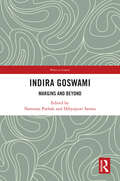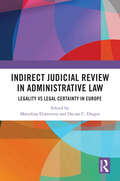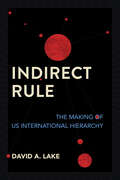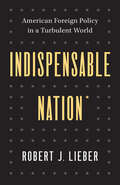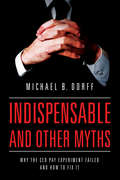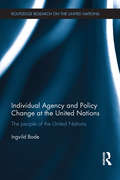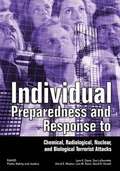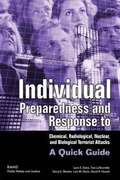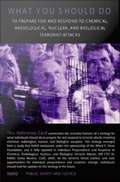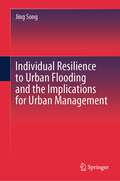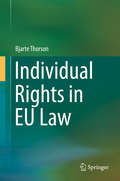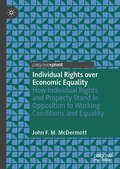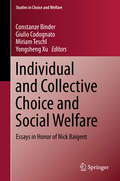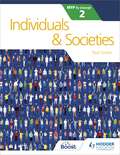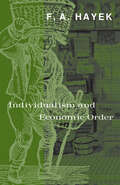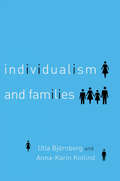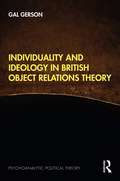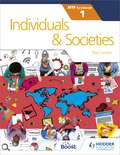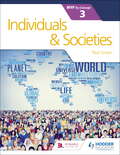- Table View
- List View
Indira Goswami: Margins and Beyond (Writer in Context)
by Namrata Pathak and Dibyajyoti SarmaThis book engages with the life and works of Indira Goswami, the first Assamese woman writer to win the highest national literary award, the Jnanpith, in 2001. From sociological treatises to a springboard of a socio-political milieu, Goswami’s texts are intersections of the local and the global, the popular and the canonical. The writer’s penchant for transcending boundaries gives a new contour and shape to the social and cultural domains in her texts. That every character is a representative of the society, that the context comes alive in every evocation of class struggle, power play, caste discrimination and gendered narratives add an interesting semantic load to her texts. While tracing the trajectories discussed above, this book foregrounds Goswami’s act of going beyond the margins of varied kinds, both abstract and concrete, in search of egalitarian and democratic spaces of life. The book looks at Indira Goswami’s works with a special emphasis on the author situated within the Assamese literary canon. It not only discusses the themes and issues within her writing, but also focuses on the distinct language and style she uses. The volume includes non-fictional prose, excerpts from her short stories and novels, viewpoints of critics, letters and entries from diaries, as well as interviews with Goswami about her writing and personal life. It engages with her works in the context of her multifaceted, almost mythical life, especially her avowed ‘activism’ against animal sacrifice and militancy in her latter career. Part of the Writer in Context series, this book will be useful for scholars and researchers of Indian literature, Assamese literature, English literature, postcolonial studies, cultural studies, global south studies, gender studies, and translation studies.
Indira Goswami: Margins and Beyond (Writer in Context)
by Namrata Pathak and Dibyajyoti SarmaThis book engages with the life and works of Indira Goswami, the first Assamese woman writer to win the highest national literary award, the Jnanpith Award, in 2001. From sociological treatises to a springboard of a socio-political milieu, Goswami’s texts are intersections of the local and the global, the popular and the canonical. The writer’s penchant for transcending boundaries gives a new contour and shape to the social and cultural domains in her texts. That every character is a representative of the society, that the context comes alive in every evocation of class struggle, power play, caste discrimination and gendered narratives add an interesting semantic load to her texts. While tracing the trajectories discussed above, this book foregrounds Goswami’s act of going beyond the margins of varied kinds, both abstract and concrete, in search of egalitarian and democratic spaces of life.The book looks at Indira Goswami’s works with a special emphasis on the author situated within the Assamese literary canon. It not only discusses the themes and issues within her writing, but also focuses on the distinct language and style she uses. The volume includes non-fictional prose, excerpts from her short stories and novels, viewpoints of critics, letters and entries from diaries, as well as interviews with Goswami about her writing and personal life. It engages with her works in the context of her multifaceted, almost mythical life, especially her avowed ‘activism’ against animal sacrifice and militancy in her latter career.Part of the Writer in Context series, this book will be useful for scholars and researchers of Indian literature, Assamese literature, English literature, postcolonial studies, cultural studies, global south studies, gender studies and translation studies.
Indirect Judicial Review in Administrative Law: Legality vs Legal Certainty in Europe
by Mariolina Eliantonio and Dacian C. DragosThis book provides a comparative analysis of the concept and concrete application of the system of indirect review of administrative action. The indirect review of administrative action is a judicial review mechanism that permits re-visiting already settled administrative measures. As an indirect way of challenging the validity of a measure or act by attacking the legal basis on which it is founded, it can regard either general acts or individual acts and measures. This book explores whether the system of indirect review is a suitable remedy for modern administrative justice, assessing whether it fairly balances the legality and the legal certainty principles. It examines the tension between the two principles and seeks to establish what the standards of review are and whether a common European trend can be discerned by analysing the theory and practice from jurisdictions in Western and Eastern Europe, as well as the EU legal system. The book will be a valuable resource for academics, researchers and policy-makers working in the areas of Administrative Law, EU law, and Public Administration.
Indirect Rule: The Making of US International Hierarchy
by David A. LakeIndirect Rule examines how states indirectly exercise authority over others and how this mode of rule affects domestic and international politics. Indirect rule has long characterized interstate relationships and US foreign relations. A key mechanism of international hierarchy, indirect rule involves an allied group within a client state adopting policies preferred by a dominant state in exchange for the dominant state's support. Drawing on the history of US involvement in the Caribbean and Central America, Western Europe, and the Arab Middle East, David A. Lake shows that indirect rule is more likely to occur when the specific assets at risk are large and governance costs are low. Lake's conceptualization of indirect rule sharpens our understanding of how the United States came to occupy the pinnacle of world power. Yet the consequences of indirect rule he documents—including anti-Americanism—reveal its shortcomings. As US efforts at democracy promotion and other forms of intervention abroad face declining support at home, Indirect Rule compels us to consider whether this method of rule ultimately advances US interests.
Indispensable Nation: American Foreign Policy in a Turbulent World
by Robert J. LieberA clear-eyed analysis of the role the United States should play in the world as it exists today The United States remains &“the indispensable nation.&” In this book, the distinguished international relations theorist and foreign policy specialist Robert Lieber argues that in a world full of revisionist powers, America&’s role is more important than ever. No other country is capable of playing that role. America remains the essential pillar of the postwar liberal order. It is a center of both political and financial stability, and it promotes important values that the revisionist powers do not. Not beholden to any particular theory, this is a clear-eyed analysis of the role the United States should play in the world as it exists today.
Indispensable and Other Myths
by Michael DorffProdded by economists in the 1970s, corporate directors began adding stock options and bonuses to the already-generous salaries of CEOs with hopes of boosting their companies' fortunes. Guided by largely unproven assumptions, this trend continues today. So what are companies getting in return for all the extra money? Not much, according to the empirical data. In Indispensable and Other Myths: Why the CEO Pay Experiment Failed and How to Fix It, Michael Dorff explores the consequences of this development. He shows how performance pay has not demonstrably improved corporate performance and offers studies showing that performance pay cannot improve performance on the kind of tasks companies ask of their CEOs. Moreover, CEOs of large established companies do not typically have much impact on their companies' results. In this eye-opening exposé, Dorff argues that companies should give up on the decades-long experiment to mold compensation into a corporate governance tool and maps out a rationale for returning to the era of guaranteed salaries.
Individual Agency and Policy Change at the United Nations: The People of the United Nations (Routledge Research on the United Nations (UN))
by Ingvild BodeThis book highlights how temporary international civil servants play a crucial role in initiating processes of legal and institutional change in the United Nations system. These individuals are the “missing” creative elements needed to fully understand the emergence and initial spread of UN ideas such as human development, sovereignty as responsibility, and multifunctional peacekeeping. The book: Shows that that temporary UN officials are an actor category which is empirically crucial, yet usually neglected in analytical studies of the UN system. Focussing on these particular individual actors therefore allows for a better understanding of complex UN decision-making. Demonstrates how these civil servants matter, looking at what their agency is based on. Offering a new and distinctive model, Bode seeks to move towards a comprehensive conceptualisation of individual agency, which is currently conspicuous for its absence in many theoretical approaches that address policy change Uses three key case studies of international civil servants (Francis Deng, Mahbub ul Haq and Marrack Goulding) to explore the possibilities of this specific group of UN individuals to act as agents of change and thereby test the prevailing notion that international bureaucrats can only act as agents of the status quo. This book will be of great interest to students and scholars of international organizations and the United Nations.
Individual Preparedness and Response to Chemical, Radiological, Nuclear, and Biological Terrorist Attacks
by Lynn E. Davis Arthur Melmed Richard KropIndividual preparedness is an important element of our nation's strategy for homeland security. This report adopts a scenario-driven approach that provides a rigorous way to identify actions-linked specifically to terrorist attacks-individuals can take to protect their health and safety. The result is an individual's strategy across four types of terrorist attacks-chemical, radiological, nuclear, and biological-consisting of overarching goals and simple and directive response and preparatory actions. The actions are appropriate regardless of likelihood of an attack, scale of attack, or government alert level; designed to be sensitive to potential variations; and defined in terms of simple rules that should be easy for individuals to adopt.
Individual Preparedness and Response to Chemical, Radiological, Nuclear, and Biological Terrorist Attacks
by Lynn E. Davis C. Peter Rydell Karyn Model James ChiesaIndividuals may have to rely on themselves to protect their own health and safety--perhaps even their own lives--in the event of a terrorist attack. Even those who know how to take care of themselves in the event of a fire, tornado, or earthquake might not know what to do in case of a chemical, radiological, nuclear, or biological attack. This quick guide attempts to fill in some of these gaps by offering specific actions to take during each of these situations, as well as preparations that can be taken. These actions are appropriate regardless of the likelihood of an attack, its scale, or the current government alert level; are designed to be sensitive to potential variations; and have been defined in terms of simple rules that should be easy to follow. A reference card included at the back of the guide encapsulates the key points and can be removed for display in a prominent place.
Individual Preparedness and Response to Chemical, Radiological, Nuclear, and Biological Terrorist Attacks
by Lynn E. Davis Tom LatourretteThe guide focuses on simple steps individuals can take to prepare for and respond to terrorist attacks with chemical, biological, radiological ("dirty bomb") and nuclear weapons. The guides contain both preparatory steps and specific response guidance. This includes what individuals will experience, what their goals should be, and what they should do during each type of attack
Individual Resilience to Urban Flooding and the Implications for Urban Management
by Jing SongThis book argues that the substantial life and property loss caused by urban flooding might not be a pure result of a vulnerable physical environment-social factors, especially the individual attributes and capacities, could have pivotal roles to play in the resilience discourse as well. In light of this, this research investigates the relationship between individual resilience to urban flooding and urban management, endeavoring to identify place-responsive measures for building resilience for residents vulnerable to urban flooding.
Individual Rights And The American Constitution (Fourth Edition)
by Douglas W. Kmiec Stephen B. Presser John C. EastmanThe Fourth Edition of Individual Rights and the American Constitution is designed for a two- or three-semester-hour course on the intellectual sources of and cases dealing with individual human rights, including especially religion, speech, and economic liberties, as well as the concepts of due process and equality. <p><p> This book explores how government power is expressly or impliedly limited to protect individual interests in religious exercise, speech, the freedom from irrational discrimination, and autonomy, as well as economic liberty. It is designed to meet the needs of professors of political science, government, history, and public policy by supplying a casebook that is at once accessible to study by virtue of generous chapter overviews, skillful case selection and editing, and extended introductions and following notes and questions. In addition, out of abundant respect for the rich intellectual tradition that exists within the university, this book fully reflects that Supreme Court cases emerge from history, and history itself reflects centuries of political and philosophical understanding.
Individual Rights and the Making of the International System
by Christian Reus-SmitWe live today in the first global system of sovereign states in history, encompassing all of the world's polities, peoples, religions and civilizations. Christian Reus-Smit presents a new account of how this system came to be, one in which struggles for individual rights play a central role. The international system expanded from its original European core in five great waves, each involving the fragmentation of one or more empires into a host of successor sovereign states. In the most important, associated with the Westphalian settlement, the independence of Latin America, and post-1945 decolonization, the mobilization of new ideas about individual rights challenged imperial legitimacy, and when empires failed to recognize these new rights, subject peoples sought sovereign independence. Combining theoretical innovation with detailed historical case studies, this book advances a new understanding of human rights and world politics, with individual rights deeply implicated in the making of the global sovereign order.
Individual Rights in EU Law
by Bjarte ThorsonThis book explores the EU law notion of 'individual rights'. It examines which sorts of rules grant EU legal rights to individuals, how it is decided if a right is conferred, and which individuals may claim the judicial protection of a right. It further discusses the legal implications and consequences of holding an EU legal right with respect to the interpretation and application of EU law in general and to specific remedies such as declaratory remedies, injunctions, restitution and damages. On a more overarching level, the book explores the question of how the idea of EU law rights relates to other fundamental EU law concepts such as the principles of effectiveness and direct effect, and discusses the legal stringency of the EU courts' 'rights language' in light of the overall aim of European integration. It thus contributes to the body of literature that aims to shed new light on the borders of the sui generis legal order that is EU law.
Individual Rights over Economic Equality: How Inalienable Rights and Property Ownership Stand in Opposition to Civil Rights and Equality
by John F. McDermottSince the mid-1960s, citizens' rights in the United States have improved across many areas, including race, gender, sexuality, physical disabilities, age, consumption of goods, voting, and more. During this time, there has also been a degradation in economic rights, such as economic inequality. Is there a reason for this contradiction? Is it possible for American citizens to experience rights and equality? At the center of natural rights theories lies the “inalienable” right to private property, and the concepts and practices of the accumulation of private property always defeat personal liberties. Modern political philosophers who espouse natural rights, including liberal John Rawls and conservative James M. Buchanan, share nearly identical premises and goals. The two sides do not often recognize that the free-standing individual at the center of mainstream theorizing in economics and politics simply does not exist. We are social animals, all embedded in (unequal) networks of social and economic relations, requiring very different explanatory frameworks from those given by individual rights theorizing. This book explores the ways in which the foundational ideology of individual rights belies the actualities of economic inequality. It argues that “individual rights” philosophy offers the main ideological basis for the astronomical accumulation of wealth that produces this inequality. Investigating the defects of rights theory, the book examines key concepts related to social progress and economic stability. The resulting text presents and analyzes the networks of contemporary corporate, business, and financial power that structurally and systemically limit the lives and choices of citizens in the United States.
Individual and Collective Choice and Social Welfare
by Constanze Binder Giulio Codognato Miriam Teschl Yongsheng XuThe papers in this volume explore various issues relating to theories of individual and collective choice, and theories of social welfare. The topics include individual and collective rationality, motivation and intention in economics, coercion, public goods, climate change, and voting theory. The book offers an excellent overview over latest research in these fields.
Individual and Societies for the IB MYP 2
by Paul GraceDevelop your skills to become an inquiring learner; ensure you navigate the MYP framework with confidence using a concept-driven and assessment-focused approach to Individuals and Societies presented in global contexts.- Develop conceptual understanding with key MYP concepts and related concepts at the heart of each chapter.- Learn by asking questions with a statement of inquiry in each chapter. - Prepare for every aspect of assessment using support and tasks designed by experienced educators.- Understand how to extend your learning through research projects and interdisciplinary opportunities.
Individual and Societies for the IB MYP 2
by Paul GraceDevelop your skills to become an inquiring learner; ensure you navigate the MYP framework with confidence using a concept-driven and assessment-focused approach to Individuals and Societies presented in global contexts.- Develop conceptual understanding with key MYP concepts and related concepts at the heart of each chapter.- Learn by asking questions with a statement of inquiry in each chapter. - Prepare for every aspect of assessment using support and tasks designed by experienced educators.- Understand how to extend your learning through research projects and interdisciplinary opportunities.
Individualism and Economic Order
by F. A. Hayek“These essays . . . bring great learning and . . . intelligence to bear upon economic and social issues of central importance to our era.” —Henry Hazlitt, NewsweekIn this collection of writings, Nobel laureate Friedrich A. Hayek discusses topics from moral philosophy and the methods of the social sciences to economic theory as different aspects of the same central issue: free markets versus socialist planned economies. First published in the 1930s and 40s, these essays continue to illuminate the problems faced by developing and formerly socialist countries.F. A. Hayek, recipient of the Medal of Freedom in 1991 and winner of the Nobel Memorial Prize in Economics in 1974, taught at the University of Chicago, the University of London, and the University of Freiburg. Among his other works published by the University of Chicago Press is The Road to Serfdom, now available in a special fiftieth anniversary edition.“There is much interesting and valuable material in this meaty . . . book which must ultimately help the world make up its mind on a vital issue: to plan or not to plan?” —S. E. Harris, The New York Times“Those who disagree with him cannot afford to ignore him . . . This is especially true of a book like the present one.” —George Soule, Nation
Individualism and Families: Equality, Autonomy and Togetherness
by Ulla Bjornberg Anna-Karin KollindAlmost all women and men claim that gender equality within their relationships is the ideal. In practice, however, equality is not predominant within many couples and families. This book develops current debates about individualisation within families – particularly how partners understand and resolve tensions between the need for togetherness and personal autonomy, and how partners view and work with increasing gender equality. Individualism and Families is based on a large Swedish study from two of the foremost European experts on the sociology of the family. The study looks particularly at partnering, parenting, intimacy, commitments, attitudes to finances and gender divisions of labour.
Individuality and Ideology in British Object Relations Theory (Psychoanalytic Political Theory)
by Gal GersonFollowing the work of prominent object relations theorists, such as Fairbairn, Suttie and Winnicott, Gal Gerson explores the correlation between analytical theory and intellectual environment in two ways. He notes the impact that the British object relations school had on both psychology and wider culture, and suggests that the school’s outlook involved more than a clinical choice. Gerson first interprets the object relations model as a political theory that completes a certain internal development within liberalism. He later outlines the relationship between the analytical theory and the historical setting in which it formed and took root. By engaging with these questions, Gerson demonstrates the deeper structure and implications of object relation theory for social philosophy. This allows him to answer questions such as: ‘What kind of social arrangements do we endorse when we accept object relations theory as a fair description of mind?’; ‘What beliefs about power, individuality, and household structure do we take in? What do we give up when doing so?’; and, lastly, ‘What does it say about contemporary advanced societies that they have taken in much of the theory’s content?’ Proposing a novel rethinking of human nature, Individuality and Ideology in British Object Relations Theory provides much-needed insight into how this school of psychoanalytic theory has impacted contemporary social and political life.
Individuals and Societies for the IB MYP 1: by Concept
by Paul GraceExam Board: IBLevel: MYPSubject: Social ScienceFirst Teaching: September 2016First Exam: June 2017Develop your skills to become an inquiring learner; ensure you navigate the MYP framework with confidence using a concept-driven and assessment-focused approach to Individuals and Societies presented in global contexts.- Develop conceptual understanding with key MYP concepts and related concepts at the heart of each chapter.- Learn by asking questions with a statement of inquiry in each chapter. - Prepare for every aspect of assessment using support and tasks designed by experienced educators.- Understand how to extend your learning through research projects and interdisciplinary opportunities.
Individuals and Societies for the IB MYP 1: by Concept
by Paul GraceExam Board: IBLevel: MYPSubject: Social ScienceFirst Teaching: September 2016First Exam: June 2017Develop your skills to become an inquiring learner; ensure you navigate the MYP framework with confidence using a concept-driven and assessment-focused approach to Individuals and Societies presented in global contexts.- Develop conceptual understanding with key MYP concepts and related concepts at the heart of each chapter.- Learn by asking questions with a statement of inquiry in each chapter. - Prepare for every aspect of assessment using support and tasks designed by experienced educators.- Understand how to extend your learning through research projects and interdisciplinary opportunities.
Individuals and Societies for the IB MYP 3
by Paul GraceA concept-driven and assessment-focused approach to Individual and societies teaching and learning.- Approaches each chapter with statements of inquiry framed by key and related concepts, set in a global context- Supports every aspect of assessment using tasks designed by an experienced MYP educator- Differentiates and extends learning with research projects and interdisciplinary opportunities- Applies global contexts in meaningful ways to offer an MYP Individual and societies programme with an internationally-minded perspective
Individuals and Societies for the IB MYP 3
by Paul GraceA concept-driven and assessment-focused approach to Individual and societies teaching and learning.- Approaches each chapter with statements of inquiry framed by key and related concepts, set in a global context- Supports every aspect of assessment using tasks designed by an experienced MYP educator- Differentiates and extends learning with research projects and interdisciplinary opportunities- Applies global contexts in meaningful ways to offer an MYP Individual and societies programme with an internationally-minded perspective
